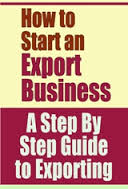How to export your agricultural products in Nigeria; Step-by-Step guide
 How to export your agricultural products in Nigeria; Step-by-Step guide
How to export your agricultural products in Nigeria; Step-by-Step guide
Exportation is the act of moving goods and commodities from one country to another, in exchange for payment. This immediately presupposes that before you can be talking about exportation, you must have a commodity of international demand ready for sales. Nigeria’s export industry remains largely underutilized because we are still waking up from our crude oil-induced slumber and the government is making every effort to promote economic diversification through non-oil exports, and I really hope the efforts being made are serious enough to get us back on track economically. If our government is sincere and serious, this will create several golden opportunities for smart entrepreneurs and farmers to key in and prosper. Yes, export business is very profitable and the earning potentials will only increase in the coming years. If you are a farmer and you have ever dreamed of selling your produce beyond the shores of Nigeria and Africa, this article is for you.
The Nigerian government through The Nigerian Export Promotion Council (NEPC) is increasingly encouraging Nigerian industrialists, businessmen and agriculturalists to export more non-oil products so as to grow the country’s export index, create jobs, and in the long run stabilize Nigeria’s economy. Nigeria’s agricultural export rose to N152.3 billion in the first six months of 2019 (January – June). This is reflected in the foreign trade reports released by the National Bureau Statistics (NBS) covering the first and second quarter of 2019. According to the reports, Nigeria’s major agricultural exports so far include palm oil, cassava, rubber, wool, cotton, wood logs (Iroko and Mahogany), groundnut oil, garlic, sesamum seeds, cashew nuts, cocoa and its diverse by-products, shrimps and prawns, ginger and a number of other agro-foods. Furthermore, the requirements for exporting goods to foreign countries from Nigeria depend largely on the products in question. So, what I will be showing you in this article is a step by step guide.
 How to export your agricultural products in Nigeria; Step-by-Step guide
How to export your agricultural products in Nigeria; Step-by-Step guide
Step one: Do a research on the export market for the product you want to export
Your overall success in international markets is largely dependent on the amount of information you have at your disposal, and the accuracy thereof. The amount of information you’ll have access to will be directly proportional to the amount of efforts you put into research. The export business is broad and requires lots of serious research. Find out about how to establish contacts with foreign buyers, check on market satiation, research on capital/startup cost, as well as best means of transportation. Ensuring you have the right freight forwarder, working with the most convenient shipping companies or flight cargoes, getting to know about the legal requirements and what kind of documents you’ll need in the process of international sale, etc. Getting it right in all of these and more issues is simply a product of research which you must do.
Getting research done has been made simple because of the internet. The internet has transformed the world into a “global village” such that a commercial ginger farmer in Kaduna, Nigeria can access the contact details of an importer of ginger based in South Korea. The buyer and seller upon introduction and establishment of contact, could also go ahead to sign a sales get the export of a certain quantity of the product at an agreed price, convenient and secured method of payment without both parties seeing each other. That is the power of the internet.
Another critical part of your research work is sourcing for buyers. One of the ways to export your products is through friends and relatives abroad. I know a lot of people who export this way. Of all the problems people encounter in the export business, a greater percentage has to do with trust. You are going into business with someone you don’t know and anything can happen. But if you have someone on the other side you can trust, everything becomes easier. Another way you can source buyers is by making use of international trade websites and portals. There are many super-hot trade websites around the globe where you can showcase your products and find foreign buyers. Most of these websites have established protocols guiding business relationships in order to ensure that transacting parties’ interests are protected.
Step two: Get essential registrations and paperwork done
First and foremost, there will be a need to register your company with the Corporate Affairs Commission (CAC). This cannot be overemphasized. Remember that you will be dealing with a lot of foreigners, and in the quest to check how credible you are, one of the things they will surely do is to carry out their own research on your business and, if possible, your person. They may run a background check with CAC to ensure your business is not a fraud, and if CAC doesn’t have any information on your company, it means you are OYO. Importation business won’t do well that way. Furthermore, CAC is also a requirement for obtaining your export certificate from NEPC. NEPC is Nigerian Export Promotion Council and exportation at the level being discussed here requires that you are registered with the council. To do this, you need to visit the NEPC office in your state and get the Exporters Registration Form at the cost of N1,000 after which you’ll be required to pay a sum of N10,000 for registration/processing fee. You will submit your completed registration form to the NEPC and attach the following documents:
- Photocopy of Company’s CAC Certificate
- Certified True Copy of Memorandum and Articles of Association
- Certified True Copy of Form CO7, in case of Limited Liability Company or a copy of the Law establishing the agency in case of Government Organization.
Read Also: 5 Rich Farmers in Nigeria and the Lessons to Learn from them
Step three: Begin shipping goods to your foreign customers.
Shipping internationally doesn’t have to be difficult, but getting the right paperwork in order and checking the relevant regulations is vital in ensuring your shipment passes through customs and other inspecting authorities smoothly. When sending goods abroad, customs can cause delays. Here are basic requirements to clear customs.
- Check shipping regulations: Variations in regulations makes exporting differ from country to country. Ensure that you are fully aware of licensing, special provisions and restricted and prohibited goods in the country you are shipping to.
- Prepare documentation: Getting the required documents in advance is vital if you want to avoid hold-ups at the border. Be sure to include all necessary information on your commercial invoice, since this is how customs authorities will classify and process your shipment.
- Duties & taxes: International shipments are often liable to import duties and taxes but that doesn’t mean you have to be caught out by them. Since these vary according to the destination and the shipment value, make sure you are fully aware of what you or the receiver will have to pay.
 How to export your agricultural products in Nigeria; Step-by-Step guide
How to export your agricultural products in Nigeria; Step-by-Step guide
Next, you have to choose a shipping company and many things will affect that choice, ranging from the nature of product being shipped to the method of shipping that’s used by the shipping company as well as the cost and ease of clearance with the company. The type of goods you want to ship (perishable or non-perishable; solid or liquid), the type of packaging you’re using and the size of the package – all of these will also affect your choices and decisions around shipping and the shipping company. There are many shipping companies and do not forget that these are part of what you need to research, if you remember what we said in the step one above. Once you are able to choose the right shipping company, there are procedures through which your shipping company will guide you through, then the next thing is to wait for your buyer(s) to notify you that they have received the goods.
Hope you enjoy this article?
Share your thoughts in the comment session.
Contact us today for your business consultancy and business advisory services. We can help you fine-tune your idea, structure your business, market your business, train your staff, consult on your retirement plan, coach you for financial success. We also write a business plan and help with fundraising strategies and Grant applications. We can help you start, grow, and expand your business.
We help institutions and organizations write concepts, implement Business plans, and train on business Plan writing in Nigeria.
We can help you write a detailed, bankable and comprehensive business plan for your business idea.
Call any of our business plan consultants on 08105636015, 08076359735 and 08113205312.
Or send a WhatsApp message or email us either at dayohub@gmail.com or info@dayoadetiloye.com.
Related